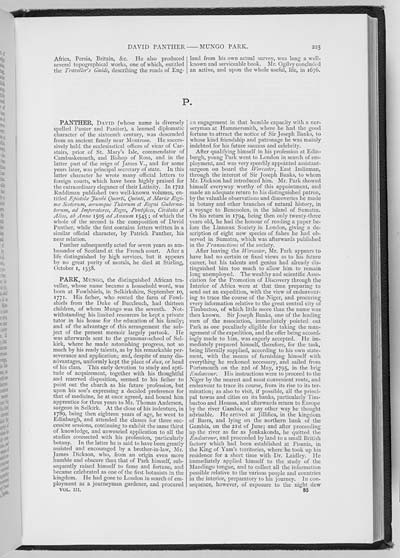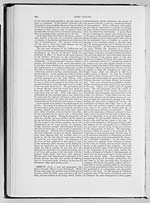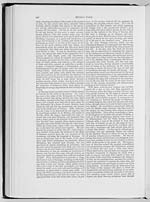Volume 3 > Half-Volume 5
(238) Page 225 - Panther, David
Download files
Individual page:
Thumbnail gallery: Grid view | List view

225 Africa, Persia, Britain, &c. He also produced several topographical works, one of which, entitled the Traveller's Guide, describing the roads of Eng- land from his own actual survey, was long a well- known and serviceable book. Mr. Ogilvy concluded an active, and upon the whole useful, life, in 1676. P. PANTHER, DAVID (whose name is diversely spelled Panter and Paniter), a learned diplomatic character of the sixteenth century, was descended from an ancient family near Montrose. He succes- sively held the ecclesiastical offices of vicar of Car- stairs, prior of St. Mary's Isle, commendator of Cambuskenneth, and Bishop of Ross, and in the latter part of the reign of James V., and for some years later, was principal secretary of state. In this latter character he wrote many official letters to foreign courts, which have been highly praised for the extraordinary elegance of their Latinity. In 1722 Ruddiman published two well-known volumes, en- titled Epistola Jacobi Quarti, Quinti, et Maries Regi- nce Scotorum, eorumque Tutorum et Regni Guberna- torum, ad Imperatores, Reges, Pontifices, Civitates et Altos, ab Anno 1505 ad Annum 1545 ; of which the whole of the second is the composition of David Panther, while the first contains letters written in a similar official character, by Patrick Panther, his near relation. Panther subsequently acted for seven years as am- bassador of Scotland at the French court. After a life distinguished by high services, but it appears by no great purity of morals, he died at Stirling, October I, 1558. PARK, MUNGO, the distinguished African tra- veller, whose name became a household word, was born at Fowlshiels, in Selkirkshire, September 10, 1771. His father, who rented the farm of Fowl- shiels from the Duke of Buccleuch, had thirteen children, of whom Mungo was the seventh. Not- withstanding his limited resources he kept a private tutor in his house for the education of his family; and of the advantage of this arrangement the sub- ject of the present memoir largely partook. He was afterwards sent to the grammar-school of Sel- kirk, where he made astonishing progress, not so much by his ready talents, as by his remarkable per- severance and application; and, despite of many dis- advantages, uniformly kept the place of dux, or head of his class. This early devotion to study and apti- tude of acquirement, together with his thoughtful and reserved disposition, seemed to his father to point out the church as his future profession, but upon his son's expressing a decided preference for that of medicine, he at once agreed, and bound him apprentice for three years to Mr. Thomas Anderson, surgeon in Selkirk. At the close of his indenture, in 1789, being then eighteen years of age, he went to Edinburgh, and attended the classes for three suc- cessive sessions, continuing to exhibit the same thirst of knowledge, and unwearied application to all the studies connected with his profession, particularly botany. In the latter he is said to have been greatly assisted and encouraged by a brother-in-law, Mr. James Dickson, who, from an origin even more humble and obscure than that of Park himself, sub- sequently raised himself to fame and fortune, and became celebrated as one of the first botanists in the kingdom. He had gone to London in search of em- ployment as a journeyman gardener, and procured VOL. III. an engagement in that humble capacity with a nur- seryman at Hammersmith, where he had the good fortune to attract the notice of Sir Joseph Banks, to whose kind friendship and patronage he was mainly indebted for his future success and celebrity. After qualifying himself in his profession at Edin- burgh, young Park went to London in search of em- ployment, and was very speedily appointed assistant- surgeon on board the Worcester, East Indiaman, through the interest of Sir Joseph Banks, to whom Mr. Dickson had introduced him. Mr. Park showed himself everyway worthy of this appointment, and made an adequate return to his distinguished patron, by the valuable observations and discoveries he made in botany and other branches of natural history, in a voyage to Bencoolen, in the island of Sumatra. On his return in 1794, being then only twenty-three years old, he had the honour of reading a paper be- fore the Linnsean Society in London, giving a de- scription of eight new species of fishes he had ob- served in Sumatra, which was afterwards published in the Transactions of the society. After leaving the Worcester, Mr. Park appears to have had no certain or fixed views as to his future career, but his talents and genius had already dis- tinguished him too much to allow him to remain long unemployed. The wealthy and scientific Asso- ciation for the Promotion of Discovery through the Interior of Africa were at that time preparing to send out an expedition, with the view of endeavour- ing to trace the course of the Niger, and procuring every information relative to the great central city of Timbuctoo, of which little more than the name was then known. Sir Joseph Banks, one of the leading men of the association, immediately pointed out Park as one peculiarly eligible for taking the man- agement of the expedition, and the offer being accord- ingly made to him, was eagerly accepted. He im- mediately prepared himself, therefore, for the task, being liberally supplied, according to his own state- ment, with the means of furnishing himself with everything he reckoned necessary, and sailed from Portsmouth on the 22d of May, 1795, in the brig Endeavour. His instructions were to proceed to the Niger by the nearest and most convenient route, and endeavour to trace its course, from its rise to its ter- mination; as also to visit, if possible, all the princi- pal towns and cities on its banks, particularly Tim- buctoo and Houssa, and afterwards return to Europe by the river Gambia, or any other way he thought advisable. He arrived at Jillifica, in the kingdom of Barra, and lying on the northern bank of the Gambia, on the 21st of June; and after proceeding up the river as far as Jonkakonda, he quitted the Endeavour, and proceeded by land to a small British factory which had been established at Pisania, in the King of Yam's territories, where he took up his residence for a short time with Dr. Laidley. He immediately applied himself to the study of the Mandingo tongue, and to collect all the information possible relative to the various people and countries in the interior, preparatory to his journey. In con- sequence, however, of exposure to the night dew 85
Set display mode to:
![]() Universal Viewer |
Universal Viewer | ![]() Mirador |
Large image | Transcription
Mirador |
Large image | Transcription
Images and transcriptions on this page, including medium image downloads, may be used under the Creative Commons Attribution 4.0 International Licence unless otherwise stated. ![]()
| Biographical dictionary of eminent Scotsmen > Volume 3 > Half-Volume 5 > (238) Page 225 - Panther, David |
|---|
| Description | Spine title: Half-Vol. V. Macadam to Smith. |
|---|---|
| Description | Volume III. Contains names alphabetically from Macadam to Young. |
|---|

